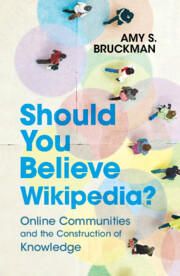Book contents
- Should You Believe Wikipedia?
- Should You Believe Wikipedia?
- Copyright page
- Dedication
- Contents
- Acknowledgments
- Introduction Design and Social Behavior
- 1 Are Online “Communities” Really Communities?
- 2 What Can Online Collaboration Accomplish?
- 3 Should You Believe Wikipedia?
- 4 How Does the Internet Change How We Think?
- 5 How Do People Express Identity Online, and Why Is This Important for Online Interaction?
- 6 What Is Bad Online Behavior, and What Can We Do About It?
- 7 How Do Business Models Shape Online Communities?
- 8 How Can We Help the Internet to Bring Out the Best in Us All?
- References
- Index
7 - How Do Business Models Shape Online Communities?
Published online by Cambridge University Press: 13 January 2022
- Should You Believe Wikipedia?
- Should You Believe Wikipedia?
- Copyright page
- Dedication
- Contents
- Acknowledgments
- Introduction Design and Social Behavior
- 1 Are Online “Communities” Really Communities?
- 2 What Can Online Collaboration Accomplish?
- 3 Should You Believe Wikipedia?
- 4 How Does the Internet Change How We Think?
- 5 How Do People Express Identity Online, and Why Is This Important for Online Interaction?
- 6 What Is Bad Online Behavior, and What Can We Do About It?
- 7 How Do Business Models Shape Online Communities?
- 8 How Can We Help the Internet to Bring Out the Best in Us All?
- References
- Index
Summary
Addresses how market issues shape what online sites exist and what they become. This is particularly relevant for how sites manage inappropriate content and bad behavior. What kind of behavior management takes place depends on what a site can afford. Today’s commercial sites can’t deliver what is healthy for people or for society, because making key decisions steered by the profit motive doesn’t magically make the right thing happen. We need more public investment in non-profit platforms driven by values.
- Type
- Chapter
- Information
- Should You Believe Wikipedia?Online Communities and the Construction of Knowledge, pp. 194 - 212Publisher: Cambridge University PressPrint publication year: 2022
- 1
- Cited by

